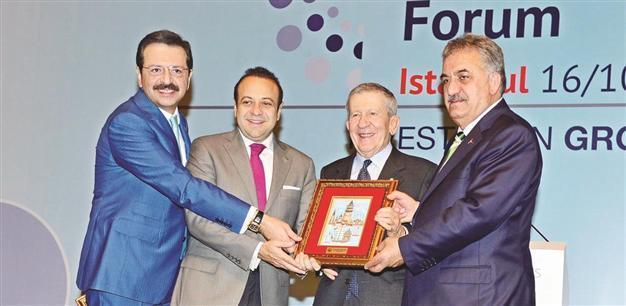EU ‘needs Turkey to overcome blockage’
ISTANBUL

EU Minister Egemen Bağış (2nd L), Customs Minister Hayati Yazıcı (R), TOBB President Rıfat Hisarcıklıoğlu (L) and Eurochambers President Alessandro Barberis meet at the Eurochambers Economics Forum in Istanbul. Eurochambers represents 20 million members across 45 countries. AA photo
The European Union needs more integration and enlargement to overcome the blockage in the region and Turkey’s membership would be to the benefit of the EU, Turkish Union of Chambers and Commodity Exchanges (TOBB) President Rıfat Hisarcıklıoğlu said Oct. 16.“The past experiences show that enlargement results in a ‘win-win’ situation for everyone, but the majority of the European citizens lost their confidence. Only 30 percent of them support integration,” Hisarcıklıoğlu, who is also the vice president of Eurochambers, said during the Eurochambers Economics Forum in Istanbul.
He noted that they, as members of the European business world, should focus on this question firstly by emphasizing the advantages of being a single and common market. Secondly, they needed to take steps in order to strengthen small and medium enterprises, which should be globalized.
Hisarcıklıoğlu added that Eurochambers, which represented an economy worth $23 trillion with more than 20 million members across 45 countries, should be taking part in the free trade deal talks between the EU and the U.S.
As the Eurochambers Economics Forum is being held in Istanbul, it showed the Turkish and European business world’s agreement on Turkey’s membership in the EU, he stressed. “This meeting is an opportunity for Turkey to actively take part in seeking solutions for Europe’s major economic problems and prove its will for contribution,” he said, adding that Turkey had Europe's third highest growth rate in the first half of the year.
Seventh biggest supplier
Hisarcıklıoğlu emphasized that Turkey was the seventh largest supplier to Europe, with a share in European markets at 2.7 percent, and ranked fifth in exports while the union’s exports to Turkey made up 4.7 percent of Turkey’s total exports.
He said Turkey and the EU were two markets in which every problem affected one another. “In reality, our business worlds are already partners,” he said.
Speaking at the same event, European Union Minister Egemen Bağış said Turkey was the sixth largest economy in Europe. “We are one of the most productive markets in Europe. Turkey is no longer a country that needs foreign loans. It is declared as the world’s fourth country that gives the most foreign aid,” he said, adding that Turkey was a "more democratic, prosperous, accountable and transparent country in every respect when compared to the past."
Customs and Trade Minister Hayati Yazıcı, meanwhile, said Turkey was at a higher level than some EU members regarding the Maastricht criteria. “The EU-defined public debts rates were above 100 percent in Portugal, Ireland, Italy and Greece last year. The rate was 81.9 percent in Germany and around 90 percent in France. However, the Maastricht criteria say it should be below 60 percent.
"Turkey’s public debt rate is only 36.2 percent. Turkey is in a better situation than some EU members with regard to these criteria,” Yazıcı said.
















